Welcome to the week.
Here are the most notable stories our writers and readers have come across in the past seven days…
Micro-EVs FTW: When it comes to making big gains on urban transportation emission goals, there’s a consensus forming that it will only happen in cities that make major moves to promote the use of micro-EVs like bicycles and scooters, combined with low-emissions zones and serious transit service upgrades. (GreenBiz)
National context: The $20+ million awarded in our region from the USDOT last week is part of a larger strategy that Transportation Sec. Pete Buttigieg calls a “preventable crisis.” (Fast Company)
Danger data: Along with those awards announced last week, the USDOT shared a data dashboard with interactive maps of the country so anyone can drill into their city to learn about traffic crash and fatality data. (USDOT)
How kids think matters: If federal regulators truly want to make the use of cars as safe as possible, they should learn more about the psychology of kids and how they make traffic decisions. (Streetsblog USA)
Get police out of traffic enforcement: “New research shows how such low-level interactions with the police can undercut our democracy by reducing the number of people who participate in elections.” (Bolts Mag)
Peak car culture: At a fast food place in North Carolina the drive-thru line was so long it obstructed traffic and blocked sidewalks, so city officials helped the restaurant build a new location with an improved, drive-thru only design. It’s induced demand for chicken sandwiches. (Yahoo News)
E-bike battery rebate: There are two e-bike rebate bills being debated by the D.C. city council, one of which would give low-income folks up to $2,000 back on their e-bike purchase. It also offers rebates on locks, replacement batteries, and service. (DCist)
He’s a bike rider: Mike Norris, newly hired coach of the Portland Thorns, loves to ride his road bike and is looking to explore more of the city on two wheels. (Timbers.com)
Beyond parking garages: “Parking garages are monuments to outdated beliefs about what makes cities thrive.” Thought this was a good story to highlight since Oregon has recently enacted several major parking reforms. (The Conversation)
Thanks to everyone who shared links this week.



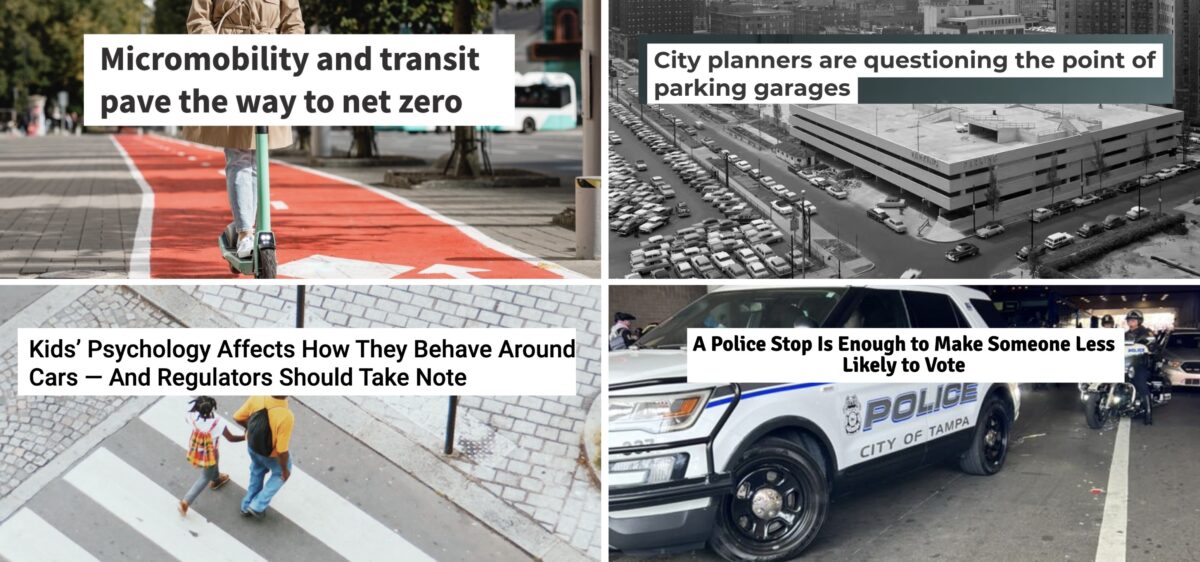
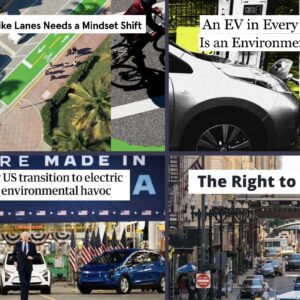
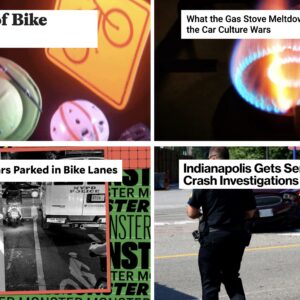
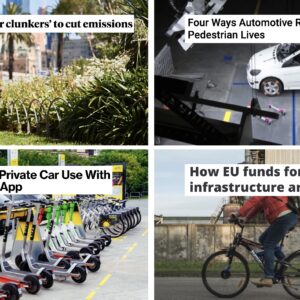
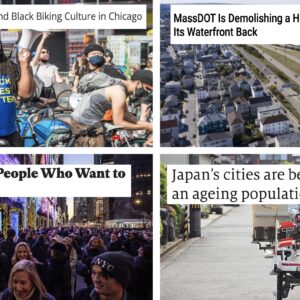
Thanks for reading.
BikePortland has served this community with independent community journalism since 2005. We rely on subscriptions from readers like you to survive. Your financial support is vital in keeping this valuable resource alive and well.
Please subscribe today to strengthen and expand our work.
$800 million to eliminate traffic deaths eh? I’m not sure $800 million would cover the price of any major cities “orphan highway complete street fund”, let alone nationally. If USDOT wants to be serious about fighting traffic fatalities, they could have a way larger impact by regulating car safety to include people outside the car as well (like they do basically everywhere else in the world).
police main point of contact with criminals traditionally are traffic stops, they stop people for DUIs, outstanding warrants, people carrying guns, drugs, suspects wanted for questioning etc – also people driving unsafe and putting the community in danger.
Plus the study linked showed no causation between police stops and voter turnout, and the drop was between 1% and 1.8% which was probably within the statistical margin of error
It certainly seems plausible that those who are less civically engaged are marginally more likely to conduct themselves in a way that increases contact with the police.
It’s more plausible that a confounding variable, e.g. poverty, leads to both over-policing and reduced civic engagement. Correlation does not equal causation.
Any study or poll that cites a 1% positive or negative reaction as being significant of anything is a joke. I am sure there is meaningful research about police interaction, this is not it.
How do the police know someone has an outstanding warrant/guns/drugs, or is wanted for questioning before stopping them? Oh that’s right, they don’t, they just use traffic stops as an excuse to harass and extort socially disadvantaged groups.
Most forms of dangerous driving can be addressed with better infrastructure and automated enforcement that doesn’t require the person writing a traffic ticket to have a gun and qualified immunity.
Drilling down into the Chick-Fil-A rebuild…the city planners are boxed in by a common land use planning issue: reconstruction of an existing use without an adopted ban on any ‘drive thrus’ especially in an auto arterial corridor. (A ban would have let the older design and use fester until either the business closed or a fatality etc. occurred) The plans do include a walk up window and small outdoor patio and a contribution payment towards a HAWK signal. I am still looking to see if there is a mitigation trigger for the point in time that traffic backups/ tailbacks into the sidewalk and roadway.
The Charlotte city planners staff report recommended that this new drive thru design be adopted: The petition could facilitate the following 2040 Comprehensive Plan goals: (1) 10-Minute Neighborhoods & (2) Safe & Equitable Mobility
As a PNW transportation planner – ~2002 – I was able once (and never again successful) to effectively argue that a proposed bank drive-thru (Vancouver Center, NE tower) was prohibited due to the then city’s then LRT corridor ordinance prohibiting auto oriented uses on Washington St. I also argued that Vancouver’s downtown had a long history of abandoned drive thru’s due to poor reuse options. (Still true and worse due to more bank failures / market deregulation. That bank only lasted 3 years before becoming an other bank and then a pet vet.)
I’ve read a few stories about long lines at drive-thrus and I always come away flummoxed by the problem.
It’s great when a business is super successful and draws a crowd! But if there’s so much interest, what is a city to do when the crowd itself poses safety problems?
It just seems like a bunch of bad options:
– mandating indoor dining would require larger parking lots
– mandating larger parking lots for all businesses has its own negatives
– crafting business-specific parking lot size mandates requires that regulators know the size of crowds in advance (Chick-Fil-A never seemed this popular when I was growing up, and I wonder if the current crowds are a fad)
– when the infrastructure is already built and a business suddenly becomes popular, it’s massively inefficient to then tear infrastructure out
The solution to super popular restaurants like this is to build many more of them! How crowded would any single In and Out become if we actually had more than one in the state? But the strict regulation of these restaurants makes it harder and slower to build them… so we end up with a fewer franchises, each drawing a huge, unmanageable crowd.
Clearly, the safety concerns must be addressed. It’s just very tough to do so.
For In-N-Out, the locations of franchises are not just anywhere – they only open a few here and there on purpose. It’s part of the business model – not the result of a regulation. Likewise (I think at least) for Chick-Fil-A – they both rely to some extent on an artificial scarcity to increase profitability of individual franchises.
If anything, we need fewer fast food franchises, not more. The obesity epidemic hasn’t exactly slowed down, and fast food chains/drive thrus have continually made things worse from a public health standpoint.
It’s a bit beside your point, but just fyi, In-N-Outs are not franchises. All locations are owned by the cooperation which is controlled by one family.
Ah, which is probably why (as Steve C points out) there is only one here.
Ok that’s a valid point from a wider angle perspective. I guess I still wonder how any municipal could react in a quick, effective, and measured way to this kind of problem. Maybe just not allowing g a drive thru would simply reduce the number of people who patronize the business.
For the land use / transportation / walkability wonks out there…the video of this Charlotte NC council vote was very interesting at all the muddle of issues they were attempting to deal with in an area they want to make more walkable and improved traffic safety. Goto item #11.
https://charlottenc.granicus.com/MediaPlayer.php?view_id=2&clip_id=3390&meta_id=484002
In “City planners are questioning the point of parking garages” the map shows the popularity of eliminating parking minimums seems to be spread among states all over the political spectrum. Granted, large cities (where I’d guess eliminating minimums may be most popular) often lean further left than the states they’re in, but still….
I like that it seems it can be supported in Portland or other West Coast “progressive” cities for say, increasing housing affordability and encouraging non-car transportation, while also being supported by an auto-centric, conservative Midwest or Texan city because of say, a belief that developers should be free to decide if they should include parking, versus having it mandated by government.
I’ve never seen any evidence that reducing parking in any particular development lowers housing costs one bit. It may well increase developer profits by letting them externalize part of their costs, but there is no evidence that I’m aware of that those profits are shared with the occupants of the units in the form of lower rents or sales prices over time.
My comment does not apply to situations where tenants are restricted from parking on nearby streets, and a lack of on-site parking could well lower rents. I completely agree with eliminating restrictions in those circumstances. I am much less enthusiastic when the public is simply subsidizing developer profits and adding obstacles to vehicle electrification.
I wasn’t taking the position that eliminating parking minimums increases affordability, just saying that’s one reason cities like Portland do it, because of a belief that it is true. I agree that making construction cheaper doesn’t automatically mean residents will see that savings.
Considering that many landlords actively conspire to fix rental prices and keep rental units empty, this is likely true.
https://www.propublica.org/article/yieldstar-rent-increase-realpage-rent
“On a summer day last year, a group of real estate tech executives gathered at a conference hall in Nashville to boast about one of their company’s signature products: software that uses a mysterious algorithm to help landlords push the highest possible rents on tenants.”
There is a good “Behind the Bastards” podcast series on this, too.
https://www.iheart.com/podcast/105-behind-the-bastards-29236323/episode/part-one-why-is-the-rent-104321463
As for e-Bike rebates…two things to learn from the State of Hawaii’s effort passed in last year’s session:
So great ideas and good intentions need more planning…